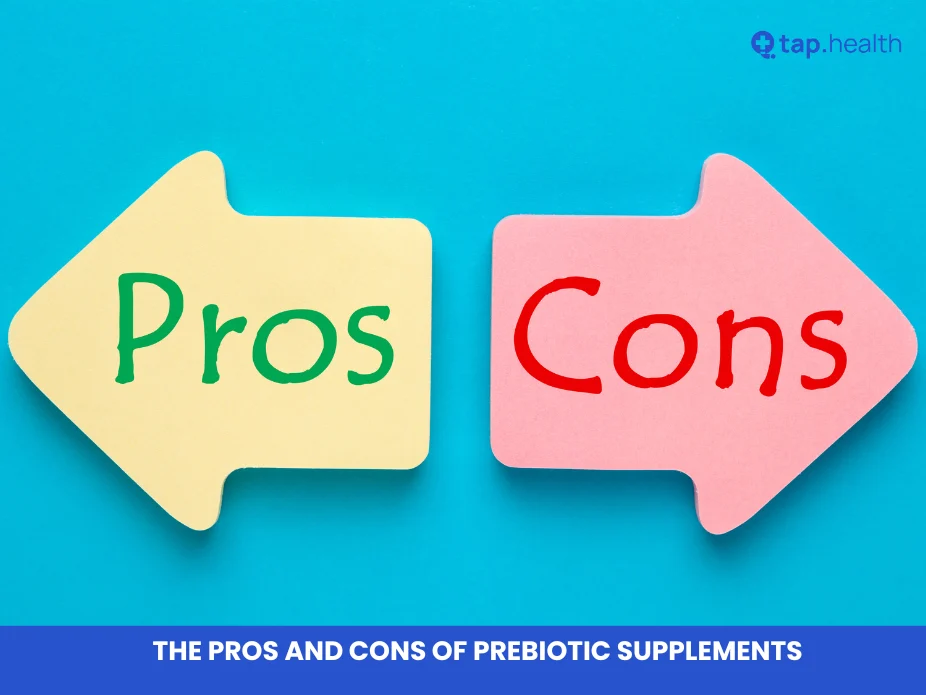In recent years, gut health has become a popular topic in the wellness world. The importance of a healthy microbiome—the trillions of bacteria that live in our gut—has been linked to everything from digestion and immunity to mood regulation and even mental health. One of the most popular ways to support a healthy microbiome is through the use of prebiotic supplements.
Prebiotics are compounds in food that feed the beneficial bacteria in our gut, promoting their growth and activity. While probiotics (live bacteria) often get the spotlight, prebiotics (the food for those bacteria) are equally important. Prebiotic supplements are designed to give your gut a boost by supplying a concentrated dose of these compounds.
But like any supplement, prebiotics come with both benefits and potential risks. In this article, we’ll explore the pros and cons of prebiotic supplements, helping you make an informed decision about whether they are right for you.
What Are Prebiotics?
Before diving into the pros and cons, it’s essential to understand what prebiotics are and how they work in the body.
Definition of Prebiotics
Prebiotics are naturally occurring, non-digestible fibers and compounds found in foods like bananas, garlic, onions, asparagus, and whole grains. These fibers pass through the digestive system without being absorbed by the body, providing a “food source” for the beneficial bacteria (probiotics) in the gut.
When consumed, prebiotics stimulate the growth and activity of these beneficial bacteria, helping to maintain a balanced and healthy microbiome. This, in turn, can improve digestion, boost immunity, and support various aspects of overall health.
Prebiotics vs. Probiotics
While prebiotics feed beneficial bacteria, probiotics are live microorganisms that can benefit your health when consumed in adequate amounts. Both work together to promote a healthy gut. However, prebiotic supplements specifically aim to support the growth of these beneficial bacteria by providing them with the nutrients they need to thrive.
The Pros of Prebiotic Supplements
1. Improved Gut Health
The most significant benefit of prebiotic supplements is their ability to support gut health. By nourishing beneficial gut bacteria, prebiotics promote a balanced microbiome. This balance is crucial for optimal digestion and overall health.
Benefits:
- Boosts beneficial bacteria: Prebiotics support the growth of good bacteria like Bifidobacteria and Lactobacilli, which can help improve gut flora.
- Promotes regular bowel movements: By feeding the beneficial bacteria that aid digestion, prebiotics can help prevent constipation and improve bowel regularity.
- Supports healthy digestion: A healthy microbiome facilitates better digestion, absorption of nutrients, and prevention of digestive disorders.
2. Enhanced Immune Function
Your gut plays a significant role in immune function, as a large percentage of immune cells reside in the digestive system. By improving gut health, prebiotics can also enhance immune response and lower the risk of infections.
Benefits:
- Increases gut barrier function: A well-balanced microbiome helps strengthen the intestinal barrier, preventing harmful pathogens from entering the bloodstream.
- Regulates inflammation: Prebiotics can help modulate immune system responses and reduce chronic inflammation in the body.
3. Better Metabolic Health
There is growing evidence to suggest that prebiotics can play a role in regulating metabolism. Certain prebiotics, such as inulin, have been shown to reduce the risk of obesity, improve insulin sensitivity, and support blood sugar regulation.
Benefits:
- Weight management: Some prebiotics can reduce appetite by promoting the release of hormones that signal fullness, leading to better appetite control.
- Improved insulin sensitivity: Prebiotics may help lower the risk of developing insulin resistance, a precursor to diabetes.
4. Mood and Mental Health Support
A healthy gut is strongly linked to mental well-being, often referred to as the gut-brain axis. Prebiotics can improve gut health, which in turn, may help improve mood and cognitive function.
Benefits:
- Reduced stress and anxiety: Studies suggest that prebiotics may help reduce symptoms of anxiety and depression by influencing the gut microbiome.
- Cognitive function: Prebiotics may promote brain health by supporting the production of neurotransmitters like serotonin, which is partly produced in the gut.
5. Improved Absorption of Nutrients
Prebiotics can enhance the absorption of key minerals, such as calcium and magnesium. A healthy gut microbiome helps improve the efficiency of nutrient absorption, making it easier for your body to absorb and utilize essential nutrients from food.
Benefits:
- Stronger bones: By enhancing calcium absorption, prebiotics can support bone health.
- Increased nutrient absorption: Prebiotics also help absorb other vital nutrients like vitamins and minerals, contributing to overall well-being.
The Cons of Prebiotic Supplements
While prebiotics offer numerous benefits, they are not without potential drawbacks. Understanding these risks is important before starting prebiotic supplementation.
1. Digestive Discomfort and Gas
One of the most common side effects of taking prebiotic supplements is gas, bloating, and digestive discomfort. This is especially true for individuals who are not used to consuming fiber or prebiotics in large quantities.
Potential Issues:
- Gas and bloating: Prebiotics are fermented by gut bacteria, which can produce gas as a byproduct. In people with sensitive stomachs, this can lead to bloating, discomfort, and flatulence.
- Initial adjustment period: If you’re new to prebiotics, your digestive system may take time to adjust, and you may experience mild discomfort as the gut microbiome adapts.
2. Excessive Fiber Intake
Many prebiotic supplements contain high amounts of fiber, which can be overwhelming if you’re not accustomed to high-fiber diets. While fiber is essential for good health, too much of it can lead to:
Potential Issues:
- Constipation or diarrhea: Excessive fiber can cause digestive disturbances, including constipation or diarrhea, especially when not enough water is consumed alongside the supplement.
- Stomach cramps: Some individuals may experience abdominal cramps if their body is overwhelmed by high fiber content in a short period.
3. Potential for Over-Supplementation
While prebiotic supplements can be beneficial, too much of a good thing is possible. If you take prebiotics in excess or combine them with other fiber-rich supplements, it may overwhelm your digestive system.
Potential Issues:
- Overstimulation of gut bacteria: Too much prebiotic fiber can result in an imbalance in the gut microbiome, causing unwanted side effects like bloating and gas.
- Difficulty with absorption: In some cases, excessive fiber intake can interfere with the absorption of nutrients and even lead to a decrease in mineral absorption over time.
4. Increased Risk for Certain Digestive Conditions
While prebiotics support gut health, people with certain digestive conditions—such as irritable bowel syndrome (IBS) or small intestinal bacterial overgrowth (SIBO)—may find prebiotics exacerbate their symptoms.
Potential Issues:
- IBS flare-ups: For those with IBS, prebiotics can worsen symptoms like bloating, abdominal pain, and diarrhea, particularly if they contain certain fibers like inulin.
- SIBO complications: In individuals with SIBO, prebiotics may feed the harmful bacteria in the small intestine, worsening digestive issues.
5. Cost of Supplements
Prebiotic supplements can sometimes be expensive, especially when compared to natural sources of prebiotics, such as garlic, onions, asparagus, or bananas. For many people, it may be more cost-effective to focus on eating a prebiotic-rich diet rather than relying on supplements.
Real-Life Scenarios
Scenario 1: Sarah, a 32-year-old woman, recently started taking a prebiotic supplement to support her digestive health. Initially, she noticed an improvement in her digestion, but after a few weeks, she began experiencing bloating and gas. After adjusting her dosage and drinking more water, her symptoms improved. She found that gradually introducing prebiotics into her diet helped her avoid digestive discomfort.
Scenario 2: Tom, a 55-year-old man with IBS, tried prebiotic supplements to improve his gut health. Unfortunately, the high fiber content aggravated his IBS symptoms, leading to more frequent flare-ups. His doctor advised him to discontinue the supplements and instead focus on consuming prebiotic foods in smaller, more manageable amounts.
Expert Contributions
Dr. Emma Green, a registered dietitian, explains: “Prebiotic supplements can offer significant benefits for gut health, but it’s important to introduce them gradually to allow the body to adjust. In some individuals, especially those with sensitive digestive systems, the initial side effects may be uncomfortable. It’s always a good idea to consult with a healthcare provider before starting a prebiotic supplement.”
Recommendations Grounded in Proven Research and Facts
Based on current research, prebiotic supplements can offer multiple health benefits, particularly for digestive health, immune support, and metabolic function. However, to avoid adverse effects like bloating, gas, or digestive discomfort, it’s important to:
- Start with a low dose and gradually increase it as your body adjusts.
- Hydrate adequately, as fiber requires water for effective digestion.
- Consider natural food sources of prebiotics, such as garlic, onions, leeks, bananas, and whole grains, as a first option before turning to supplements.
Conclusion
Prebiotic supplements can be a valuable addition to your health regimen, offering a wide range of benefits for gut health, immune function, and even mood regulation. However, they are not without potential drawbacks. Digestive discomfort, excessive fiber intake, and possible complications for people with certain digestive conditions are some of the risks to consider.
As with any supplement, it’s important to listen to your body, start slowly, and consult with a healthcare professional if you have any concerns. In many cases, focusing on a diet rich in natural prebiotic foods may be the most effective and sustainable way to support your gut health.
Sources:
- National Institutes of Health (NIH): Prebiotics and Gut Health
- Harvard T.H. Chan School of Public Health: Gut Microbiome and Prebiotics
FAQs About Prebiotic Supplements
Q1: Can prebiotics help with constipation?
Yes, prebiotics can help improve bowel regularity by feeding beneficial gut bacteria that promote digestion. However, it’s important to start with a low dose to avoid digestive discomfort.
Q2: Are prebiotics the same as probiotics?
No, prebiotics and probiotics are different. Prebiotics are non-digestible fibers that feed beneficial gut bacteria, while probiotics are live bacteria that support gut health.
Q3: Can prebiotic supplements be harmful?
For most people, prebiotic supplements are safe when taken as directed. However, excessive intake can lead to digestive discomfort, such as bloating and gas.
Q4: How do I know if I need prebiotic supplements?
If you have digestive issues, a weakened immune system, or difficulty maintaining healthy gut bacteria, prebiotic supplements may be beneficial. Consult a healthcare professional for personalized advice.
Q5: Can I get enough prebiotics from food alone?
Yes, many natural foods are rich in prebiotics, such as garlic, onions, bananas, leeks, and whole grains. A well-balanced diet should provide most of the prebiotics your body needs.



